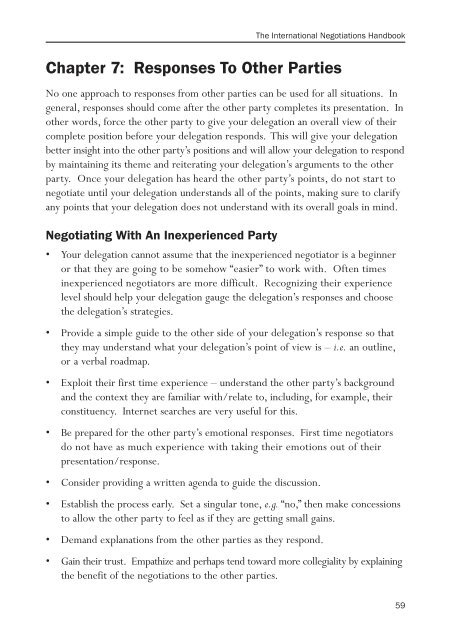The International Negotiations Handbook - Baker & McKenzie
The International Negotiations Handbook - Baker & McKenzie
The International Negotiations Handbook - Baker & McKenzie
You also want an ePaper? Increase the reach of your titles
YUMPU automatically turns print PDFs into web optimized ePapers that Google loves.
Chapter 7: Responses To Other Parties<br />
No one approach to responses from other parties can be used for all situations. In<br />
general, responses should come after the other party completes its presentation. In<br />
other words, force the other party to give your delegation an overall view of their<br />
complete position before your delegation responds. This will give your delegation<br />
better insight into the other party’s positions and will allow your delegation to respond<br />
by maintaining its theme and reiterating your delegation’s arguments to the other<br />
party. Once your delegation has heard the other party’s points, do not start to<br />
negotiate until your delegation understands all of the points, making sure to clarify<br />
any points that your delegation does not understand with its overall goals in mind.<br />
Negotiating With An Inexperienced Party<br />
• Your delegation cannot assume that the inexperienced negotiator is a beginner<br />
or that they are going to be somehow “easier” to work with. Often times<br />
inexperienced negotiators are more difficult. Recognizing their experience<br />
level should help your delegation gauge the delegation’s responses and choose<br />
the delegation’s strategies.<br />
• Provide a simple guide to the other side of your delegation’s response so that<br />
they may understand what your delegation’s point of view is – i.e. an outline,<br />
or a verbal roadmap.<br />
• Exploit their first time experience – understand the other party’s background<br />
and the context they are familiar with/relate to, including, for example, their<br />
constituency. Internet searches are very useful for this.<br />
• Be prepared for the other party’s emotional responses. First time negotiators<br />
do not have as much experience with taking their emotions out of their<br />
presentation/response.<br />
• Consider providing a written agenda to guide the discussion.<br />
• Establish the process early. Set a singular tone, e.g. “no,” then make concessions<br />
to allow the other party to feel as if they are getting small gains.<br />
• Demand explanations from the other parties as they respond.<br />
<strong>The</strong> <strong>International</strong> <strong>Negotiations</strong> <strong>Handbook</strong><br />
• Gain their trust. Empathize and perhaps tend toward more collegiality by explaining<br />
the benefit of the negotiations to the other parties.<br />
59

















